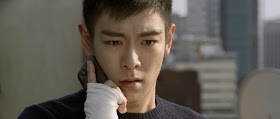By Pierce Conran
After his father's failed mission in the South, Myung-hoon and his sister are sent to a prison camp in North Korea. Accepting his own mission as an undercover spy to protect his sister from further harm, Myung-hoon infiltrates the south, where he poses as a high school student. He ends up helping a bullied girl in his school while going out interrogating people to learn what happened to his father during his free time. Soon his government learns what he is up to and sends someone to kill him.
Beginning with the doomed fate of Myung-hoon's father, Commitment gets off on the right foot. A few stereotypical genre characters are presented to us with a straight face but within suitably atmospheric locations and a mise-en-scene that creates palpable tension. It's well shot and paced too but the problem is that while each scene works on its own, there is a sense that it isn't all going to tie together. Consequently, as impressive as its opening salvo is, Commitment quickly moves on to the very different high school genre, scenes which also work on their own merit, but here lies the problem.
From there on out the film oscillates aggressively between thriller, high school and dramatic elements, doing well with each, without ever coming close to a cohesive whole. Unlike the more successful Korean genre hybrids of the past, such as Jang Joon-hwan's Save the Green Planet (2003) and Bong Joon-ho's The Host (2006), this exercise in genre diversification is more akin the channel surfing during an ad break.
Choi Seung-hyun, better known to many as the K-pop singer T.O.P. from the group Big Bang, takes on his first lead role here, following supporting turns in Korean War film 71: Into the Fire (2010) and the popular K-drama Iris (2009), in which he also played an assassin, though one with no conscious. With his steely glares and sharp cheekbones, Choi has no trouble playing a cold killer, however he struggles more with the emotional demands of his character. Granted, Myung-hoon is a terse, taciturn protagonist but Choi's depiction of his inner turmoil never amounts to much more than a pained facial expression.
Slightly more successful in the cast though not called on to bring forth more than their usual onscreen personas are Han Ye-ri (Dear Dolphin) as a cute and withdrawn high school girl, Yoon Je-moon (Boomerang Family) as the brash, yet sympathetic South Korean detective and Jo Sung-ha (Pluto) as the ruthless North Korean captain. Much like the film's well-staged though disparate sequences, their characters work well within their pre-defined milieus but never threaten to transcend the chasms between the film's genres.
Another problem arises with the antagonists, or rather that the threat in the narrative transfers from one villain to another all to quickly, thereby draining each of their effect. Different generic landscapes and different acts identify separate characters as the source of danger, a strategy that reinforces Myung-hoon as the hero (or anti-hero depending on how you look at him), but achieves little else.
Still, if anything the film showcases new director Park Hong-soo's (formerly an assistant director on films such as Rough Cut (2008), Secret Reunion (2010) and The Front Line (2011)) ability to craft a scene. Less certain, judging on his debut, is his capacity to steer a narrative from its parts to a satisfying sum, which, depending on this film's success, we may or may not get to find out in future. It bears mentioning that Park did not write the script and was also a quick replacement for Park Shin-woo, the White Night (2009) director who dropped out of the project during filming due to creative differences.
As previously mentioned, there are some enormous similarities between Commitment and Secretly Greatly. However, though the latter came out four months earlier, the former was actually the first to go into production. Both films are uneven and feel slightly hollow but at least Commitment doesn't ply the audience with too much false emotion. There's plenty that works in the film but without the narrative glue and the smooth blending (the editing is at times subpar) it needs to work, Commitment feels like a 113-minute collection of scenes.
★★★☆☆
Reviews and features on Korean film appear regularly on Modern Korean Cinema. For film news, external reviews, and box office analysis, take a look at the Korean Box Office Update, Korean Cinema News and the Weekly Korean Reviews, which appear weekly on Monday, Wednesday, and Friday mornings (Korean Standard Time).

.jpg)



No comments:
Post a Comment